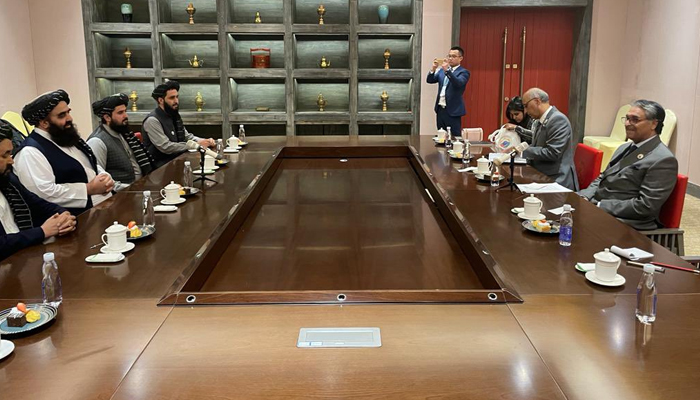In meeting with Afghan FM, Jilani calls for joint efforts to address security challenges
FM Jilani says challenges confronting regional peace be addressed in collaborative spirit through collective strategies
Caretaker Foreign Minister Jalil Abbas Jilani has apprised Afghanistan's Interim Foreign Minister Amir Khan Muttaqi regarding challenges that are confronting regional peace.
The interim government has given a 28-day deadline (November 1) to all illegal immigrants, including Afghan refugees, to leave the country or face forceful expulsion.
In a statement, the Ministry of Foreign Affairs said Jilani "underscored that challenges confronting regional peace & stability be addressed in collaborative spirit thru collective strategies".
"The FM reaffirmed Pakistan's commitment to further strengthen bilateral ties with Afg[hanistan]," the ministry said.
Their meeting was held in Tibet, China, where the foreign minister is visiting China to participate in the Third Trans-Himalaya Forum for International Cooperation — being held from October 4 to 5.
The major decision to ask illegal migrants to leave the country came after Pakistan witnessed an uptick in unlawful and terror activities — that also involves Afghan nationals.
"We have given them a November 1 deadline," said interim Interior Minister Sarfraz Bugti on October 3, adding that all illegal immigrants should leave voluntarily or face forcible expulsion after that date.
The interior minister revealed that 14 of 24 suicide bombings in the country this year were carried out by Afghan nationals.
Bugti said some 1.73 million Afghan nationals in Pakistan had no legal documents to stay, adding a total of 4.4 million Afghan refugees lived in Pakistan.
Islamabad has received the largest influx of Afghan refugees since the Soviet invasion of Kabul in 1979.
But the country has seen a rise in terrorism after outlawed Tehreek-e-Taliban Pakistan (TTP) — a group that has safe havens in Afghanistan — revoked a ceasefire with the government late last year.
Two suicide bombings targeted religious gatherings in Pakistan last week, killing at least 57 people. Bugti said that one of the suicide bombers had been identified as an Afghan national.
Taliban authorities have been trying to tempt back those who left, despite the nation suffering from a massive scaleback of aid following the collapse of the US-backed government.
Also, in response to Pakistan's plan to evict hundreds of thousands of Afghan migrants, Taliban authorities said it was "unacceptable".
-
Security forces gun down 30 terrorists in multiple IBOs in KP: ISPR
-
MQM-P calls for new province in Sindh
-
US report validates Pakistan military edge over India: PM
-
Banned TTP poses serious threat to Pakistan security: UNSC panel
-
CM Afridi clarifies remarks on by-poll after ECP requests army deployment
-
Dubai sees 3.2m Pakistani passengers in 2025 as airport sets new milestone
-
Security forces kill 23 Indian proxy terrorists in KP's Kurram
-
Pakistan to construct island to boost oil exploration: report












